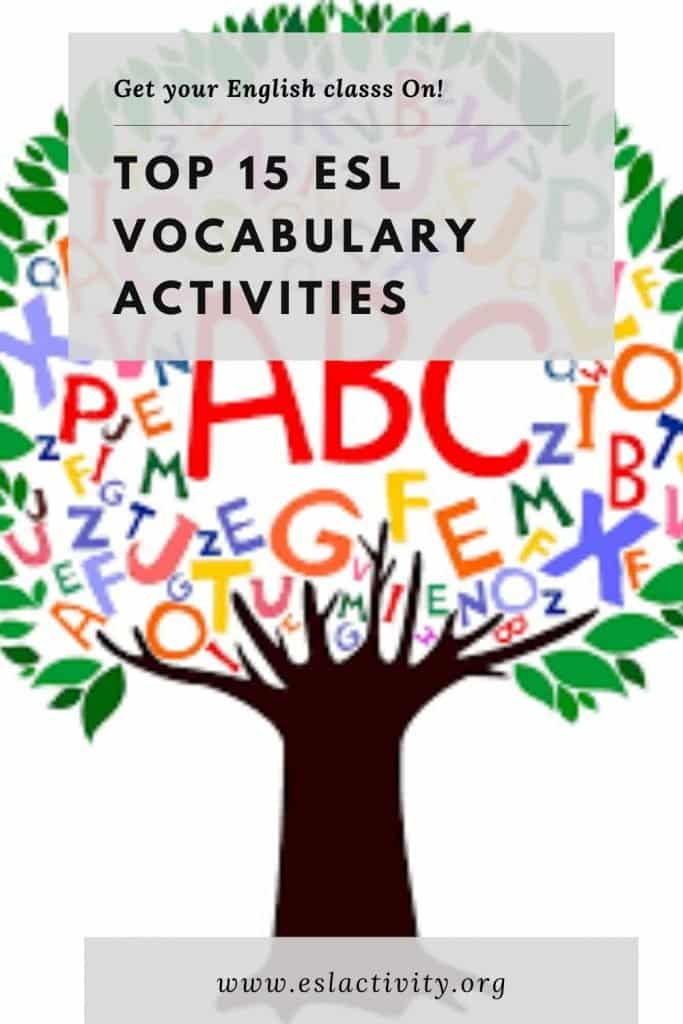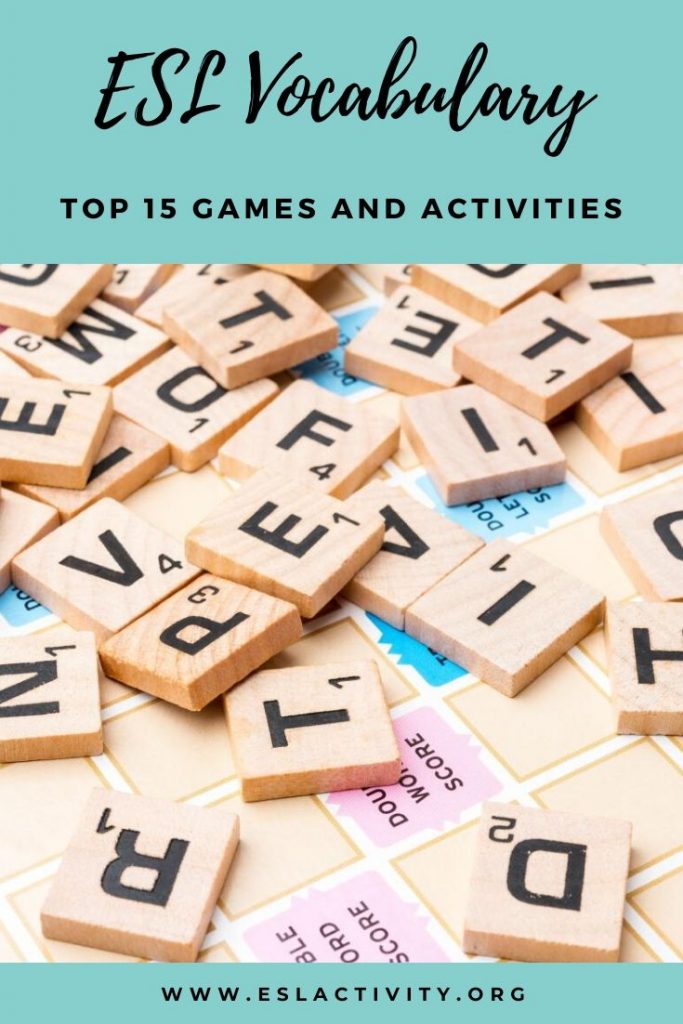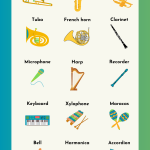If you’re looking for some of the best ESL vocabulary activities or TEFL vocabulary games for kids as well as adults, then you’re in the right place. Keep on reading for our top picks for activities and games to help English learners with new vocab.

ESL vocabulary games and activities
One year when I was teaching university students in South Korea, I had to teach a “vocabulary” class at a camp. I never taught vocabulary before, so it was a bit challenging to say the least! However, I used a variety of vocabulary activities for ESL students and had some great results!
I knew that it had the potential to be a very boring class. Or, it could be quite decent! I wanted to make it painless for my students, so I spent lots of time finding fun, interesting ESL vocabulary activities. Here are a few of my favourites.
I hope you enjoy them and also find them useful. Remember that the key to an excellent English class is to mix things up a bit and keep it fun for the students you’re teaching.
ESL Vocabulary Activities and Games
If you want to make vocabulary memorable and fun for your students, be sure to try out these ESL vocabulary activities for adults. They’re guaranteed to take teaching vocabulary from the normally tedious to fun, engaging, and awesome.
#1: Concentration Memory Game
This is a classic ESL vocabulary activity that works well if you want your students to focus solely on words and definitions. This is the first step before you get into activities that focus more on using the words in a real-life conversation or in writing of some kind.
Learn more here: Concentration Memory Game for ESL Students.
- Amazon Kindle Edition
- Bolen, Jackie (Author)
- English (Publication Language)
- 71 Pages - 10/26/2015 (Publication Date)
#2: Apples to Apples ESL Vocabulary Game
This is one of the best games for having some fun with vocabulary. You can make your own set of cards focusing on whatever you’re teaching that week, or you can buy the ready-made game from Amazon. Perfect for busy teachers! It really does make an excellent activity for a game-day in your ESL classes.
Check it out here: Apples to Apples for English Learners.
#3: Typhoon
A nice way to review about kind of English vocabulary is with the typhoon game. It’s a fun game for all ages!
#4: Word Association
One of my favorite ways to introduce a new unit in the textbook is to use this word association activity. It makes a great warm-up because it’s an excellent way to activate the student’s prior knowledge. Setting the context is key to having a successful lesson and using this activity is one great way to do just that.
Find out how to do it here: Word Association Vocabulary Activity.
#5: Dictogloss
In terms of ESL vocabulary activities for adults, you’re not going to get better than dictogloss. It has an element of cooperation, an element of competition, and provides a serious challenge for your students.
It’s so great because it encourages students to use alternative words if the one that you said isn’t accessible to them for some reason. This is what students need to do in real life so give them some practice doing it in class.
Find out more about this classic, 4-skills ESL game here: Dictogloss.
- Bolen, Jackie (Author)
- English (Publication Language)
- 123 Pages - 06/18/2021 (Publication Date) - Independently published (Publisher)
#6: Flip-Chart Vocabulary Review Game
If you want to have a bit of fun while reviewing some new vocabulary words, look no further than this flip-chart game. It works well for any age group or level so try it out in your class today and make learning English vocabulary awesome!
Interested in using it in your TEFL classes? Learn more about it here: Vocabulary Review Game.
#7: The A to Z Vocab Game
If you’re looking for a quick, simple warmer that requires nothing in the way of materials or preparation, then you’ll definitely want to consider the AtoZ game. It’s an ideal way to help students activate their prior knowledge about a certain topic.
For example, if you’re teaching a unit about jobs, weather, or animals, chances are that your students have already studied this multiple times in the past. The way it works is that students need to think of a word related to the topic that begins with each of these letters in a certain amount of time.
More details here: The A to Z ESL Game.

Vocabulary activities for ESL students
#8: Word Challenge ESL Vocabulary Activity
If you want to review key vocabulary words, then you’ll want to consider this ESL spelling activity. The way it works is that students race to write words on the whiteboard with the correct spelling. Want to give it a try in your classes? You can find out all the details here:
ESL Word Challenge Spelling Game.
- Amazon Kindle Edition
- Bolen, Jackie (Author)
- English (Publication Language)
- 90 Pages - 08/26/2021 (Publication Date)
#9: Fly Swatter Game
If you want to create some fun and excitement in your classes during an ESL vocabulary lesson, then consider trying out the fly swatter game. The way it works is that you write a bunch of new words on the board and then give hints. The first person to slap the correct word gets a point for their team.
There are lots of different variations of this fly swat game beyond this very basic version. Learn more about it here:
#10: TEFL Vocabulary Games
#11: Odd One Out Vocab Game ESL
If you’re looking for a fun, quick way to review English vocabulary, then you’ll want to consider Odd One Out. The way it works is that you write groups of 4 words on the board and one of them is the odd one out. For example:
- Banana, carrot, orange, grapes
Students have to choose which one doesn’t belong and say why. There are many possible answers but the obvious one is carrot because it’s a vegetable and not a fruit. Want to know more? Check out all the details here:
#12: Dictation Practice
Another great to review new vocabulary words for English learners is to do some dictation. Besides vocabulary, this activity is heavy on the listening and writing skills, as well as punctuation, syntax and spelling. Want to give it a try with your students? Here are the tips you need for getting started:

Vocabulary activities and games for ESL
#13: Journaling for ESL
A nice way to have students keep new vocabulary words fresh is to have them keep a journal. It’s possible to assign this as a homework assignment or take a few minutes at the beginning or end of class for it. If you want students to focus on certain new words, assign topics well and it’ll likely happen naturally. Learn more about this ESL writing activity here:
#14: Speaking Fluency Activity
#15: Listening for One Specific Thing
A nice way to review some key vocabulary words is to find a listening passage that contains them in it. Then, have students listen for these key words. Want to know more about how to do this with your students? Get all the details here:
ESL Listening—1 Specific Thing.
- Amazon Kindle Edition
- Bolen, Jackie (Author)
- English (Publication Language)
- 70 Pages - 11/28/2015 (Publication Date)
#16: ESL Surveys
If you ask my students, they’ll tell you how much I love surveys. Not only are they an excellent vocabulary activity for ESL but they also cover a range of other skills. Plus, they get students up and out of their seats, moving around the classroom.
The best part is that they can be used for basically any grammar point or topic. Check them out here:
#17: Use an ESL Warmer
#18: Eliciting in an ESL Vocab Lesson
Unless your students are absolute beginners, they likely already know a number of vocabulary words related to whatever the topic of the day is. In this case, consider eliciting some of them from the students! There are two main reasons to do this.
The first reason is that it’s easier to tailor the rest of the lesson to words that students don’t know, instead of ones that they do. Secondly, activating prior knowledge that students may have about a topic makes it easier for them to learn new words. Find out more details about how to do it:
#19: TEFL Board Games
#20: TV ESL Lesson Plan
It’s best to teach new vocabulary that is related to each other. This makes them far more memorable than it is to just teach random words. One of the best ways to do this is to use a topical lesson plan.
Here’s my favourite style of a lesson, complete with warmer questions, vocabulary challenge, idioms and phrases, conversation questions and some writing prompts:
ESL TV Conversation Lesson Plan.
Like this lesson plan? It’s from this book:
- Amazon Kindle Edition
- Bolen, Jackie (Author)
- English (Publication Language)
- 211 Pages - 07/12/2020 (Publication Date)
#21: Mystery Box
This ESL vocabulary game for kids is a great way to add a bit of excitement and fun into your classes! Put in some common objects that students know the words for. Then, they have to answer some questions and make some guesses about what’s in there.
Find out all the details about it:
#22: 20 Questions
#23: Idiom Vocabulary Activity for ESL
Idioms are a special kind of vocabulary and are very common in the English language. However, they can sometimes be a bit difficult for our students to remember and then use them correctly. This activity changes that! It’s fun, entertaining and also makes idioms very memorable so that students will never forget them. Find out all the information about how to do it:
Also check out: Top 10 Idioms in the USA.
#24: Brainstorming Games
It’s often the case that unless students are total beginners, they’re studied many of the same topics previously. In this case, consider using a brainstorming activity that will help students activate their prior knowledge. This will help new things to stick better. Another situation in which to use them is for a review activity at the end of class to reinforce knowledge learned. All the details are here:
Brainstorming Activities for Students.
#25: Current Events Conversation Lesson
If you want to help students with their vocabulary in a big way, why not talk about some current events? Changes are, there are a whole bunch of words that they don’t know. However, being able to converse freely about what’s in the news lately can be really helpful for our students in a variety of situations.
Have a look here at this lesson plant that I put together for this:
#26: Business English Vocabulary
If you teach business people, then consider helping them with business English expressions, idioms and phrases. Check out this book for some American English dialogues for a variety of business situations and scenarios.
- Amazon Kindle Edition
- Bolen, Jackie (Author)
- English (Publication Language)
- 91 Pages - 11/25/2020 (Publication Date)
#27: ESL Directions Games and Activities
A key vocabulary set for beginners to learn is related to giving and getting directions. If students are going to travel outside of their home country, it’s certainly a valuable thing for them to know! Here are some of the top picks:
#28: Name 5 Things Vocabulary Quiz
#29: Word Category Games
When teaching vocabulary, I like to focus on categories of words like jobs, animals, food, etc. This makes new words far more memorable than just random words that aren’t connected in any way. For some of the best ideas for this type of lesson, have a look here:
#30: Closest in Meaning
If you want to review some English vocab, consider trying out this simple reading activity. Students have to read the original sentence and then choose another sentence that most closely matches that one. It’s a nice warmer activity to review new words from previous classes. Check it out:
Closest in Meaning Reading Activity.
#31: Advanced English Conversation Dialogues
- Bolen, Jackie (Author)
- English (Publication Language)
- 96 Pages - 11/06/2020 (Publication Date) - Independently published (Publisher)
One of the best ways to help students learn more phrases and idioms in American English is to pick up this book. It has hundreds of them, taught through dialogues and then a practice exercise. Help your students speak more fluently!
#32: TEFL Clothes Quiz
#33: Once in a Blue Moon Lesson Plan
A nice way to teach English phrases and expressions is through a lesson plan like this one. It’s for higher-level students and can be done in class, or as a self-study assignment. Check it out here:
Once in a Blue Lesson ESL Lesson Plan.
#34: Offering Help English Phrases and Dialogues
- Amazon Kindle Edition
- Bolen, Jackie (Author)
- English (Publication Language)
- 148 Pages - 11/22/2020 (Publication Date)
Of course, ESL vocabulary is far more than just single words, out of context. Much of English can be found in phrases, expressions, idioms, phrasal verbs, collocations, etc. That’s why it’s useful to teach our students these things too!
Here’s one example of a small lesson for teaching about offering help:
Common English Phrases for Offering Help.
#35: Chain Spelling
A nice vocabulary activity ESL is this chain spelling game. It’s simple, requires nothing in the way of preparation or materials, and is a perfect way to review spelling.
The way it works is that everyone stands up and then you say a target vocabulary word. The students take turns spelling it, letter by letter and if someone misses, they are out and have to sit down. Continue playing until only 1-2 people are left standing.
#36: Hot Potato
#37: Scatter Sheets for Beginner to Intermediate English Learners
A nice way for students to learn more vocab is to use these scatter sheets. They’re a no-prep solution that you can just print off and take to class. Want to find out more? Have a look right here:
#38: ESL Emotion Activities
I love to teach students how to express their feelings and emotions in English. Have a look here at some of the best ways to do that:
#39: I’m an Alien
Try out this fun way to elicit words from students that they may already know.
#40: Round Robin Story
Making a story is a really nice way to use a bunch of new vocabulary! Have a look here for all the details you need to know:
ESL Round Robin Story Activity.
#41: Have a Debate
A nice way for students to learn a bunch of new vocab about a topic is to do a debate in class. There are lots of fun ideas for a variety of ages and levels. Have a look right here:
#42: Jigsaw (Information Gap) Activities
#43: Vocabulary Poster
Generate a list of vocabulary you want your students to remember no matter what. Assign one word per student. Each student has to be the master of the assigned word and must create a vocabulary poster consisting of a drawing and a sentence using the word. These posters can be used to decorate the classroom wall.
#44: Shape Names with Pictures
Learning the shapes is a nice option for beginners. Check out this article for some pictures and names:
Shapes name with pictures in English.
Teaching English Vocabulary FAQs
There are a number of common questions that people have about teaching English vocabulary. Here are the answers to some of the most popular ones.
How do ESL Students Practice Vocabulary?
There are a number of ways for ESL students to practice vocabulary, including the following:
- keeping context in mind
- repetition
- teaching-related vocabulary
- tests
- conversation
- practicing online
- etc.
What are some Fun Ways to Teach Vocabulary?
There are a number of fun ways to teach vocabulary, including games and activities like Mad Lib, Running Dictation, Spelling Race, Apples to Apples and Dictogloss.
What is a Vocabulary Activity?
A vocabulary activity is something that helps students learn new terms and words in context. The best ones allow for the repetition of these new words in order to make them more memorable.
What is the Best Way to Test Vocabulary for ESL?
There are a number of ways to test vocabulary for ESL including simple translations into the first language or matching the word with a definition. However, the best way to test vocab is within a context, either placing the word in a sentence or having students write their own sentences.
Why do we Teach Vocabulary?
Without a basic working vocabulary, it’s impossible to understand anything you’re hearing or reading. That’s why it’s vital to teach vocabulary to language learners.
How can I Teach New Words to Children?
What are some Tips for Teaching New Vocabulary to English Learners?
Teaching new vocabulary to English learners requires careful planning and consideration. Here are some effective tips to help you teach vocabulary in a way that enhances understanding and retention:
- Contextualize the Vocabulary: Introduce new vocabulary within a meaningful context that is relevant to the learners’ lives and experiences. Use visuals, real-life examples, stories, or situations to help students connect the words to their existing knowledge and make the learning more meaningful.
- Use Visuals and Realia: Supplement verbal explanations with visual aids such as pictures, flashcards, or objects related to the vocabulary. Visuals help create mental associations between the word and its meaning, making it easier for students to remember and understand the new vocabulary.
- Provide Clear Definitions: Offer clear and concise definitions of new words in simple language that matches the learners’ proficiency level. Use examples, synonyms, or gestures to help students grasp the meaning of the word in context.
- Use Context Clues: Teach students to use context clues to infer the meaning of unfamiliar words. Encourage them to look for surrounding words, phrases, or sentences that provide hints about the word’s meaning. This strategy fosters independent vocabulary learning and develops reading comprehension skills.
- Teach Word Families and Word Forms: Introduce related words that belong to the same word family or share the same root. Teach different forms of the word (noun, verb, adjective, adverb) to expand students’ understanding and usage of vocabulary in various contexts.
- Practice with Contextualized Sentences: Provide students with model sentences that demonstrate the correct usage of the new vocabulary. Engage students in activities where they can practice using the words in meaningful sentences. This helps reinforce understanding and encourages active usage of the vocabulary.
- Offer Multiple Exposure and Repetition: Present new vocabulary multiple times and in various contexts to enhance retention. Use different activities, games, or exercises to revisit the words over time. Repetition helps reinforce vocabulary and solidify students’ understanding.
- Encourage Active Engagement: Engage students in interactive activities that require them to actively use and apply the new vocabulary. Role-plays, discussions, group work, or hands-on tasks encourage students to actively participate and practice using the words in authentic contexts.
- Provide Opportunities for Personalization: Encourage students to relate new vocabulary to their own lives, experiences, or interests. Ask them to create personal connections, share personal stories, or write sentences using the vocabulary in their own context. Personalization enhances relevance and helps students internalize the words.
- Review and Recycling: Schedule regular vocabulary review sessions to reinforce previously taught words. Incorporate vocabulary games, quizzes, or flashcard activities to make the review process interactive and engaging.
- Use Technology and Online Resources: Explore online resources, vocabulary-building apps, or interactive websites that offer engaging activities and exercises for vocabulary development. Digital tools can provide additional practice opportunities and cater to different learning styles.
Remember to consider the learners’ proficiency level, age, and individual needs when planning vocabulary instruction. By incorporating these tips, you can make vocabulary learning more enjoyable, meaningful, and effective for English learners.
Have Your Say about ESL Vocabulary Exercises and Games
What are some of your favorite activities or games to help your students remember English vocabulary more easily? Leave a comment below and share your top tips with us. We’d love to hear from you.
Also be sure to give this article a share on Facebook, Twitter, or Pinterest. It’ll help other busy teachers, like yourself, find this useful teaching resource.
Last update on 2022-07-17 / Affiliate links / Images from Amazon Product Advertising API












